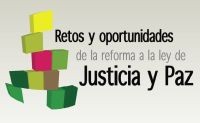Nearly seven years of investigations and trials held under Colombia’s Law 975—known as Justice and Peace Law (JPL)—have brought to light the numerous challenges faced by the law. The government estimates at its current pace the process, designed to bring to justice demobilized paramilitaries and uncover the truth about their crimes, would take more than 100 years to complete.
Recognizing these challenges, the government and Prosecutor General’s Office introduced a reform bill which is currently being debated in congress. In the meantime, civil society organizations actively discuss whether these reforms adequately fulfill the rights and needs of victims.
An open discussion
With the goal of creating an opportunity for debate between civil society and the Colombian government on JPL reform, ICTJ and the Mission to Support the Peace Process from the Organization of American States have organized an event titled “Challenges and Opportunities of the Justice and Peace Law Reform,” to take place May 14 in Bogotá, with the support of the Swedish and Swiss Embassies.
The event will feature presentations by Jorge Perdomo Torres, deputy general prosecutor; Uldi Teresa Jiménez, a judge from the Justice and Peace Unit of the Bogotá Court; Hugo Velásquez, member of the Chamber of Representatives who has led the reform initiative in congress; Gustavo Gallón, director of the Colombian Commission of Jurists; and Miguel Samper, director of transitional justice of the Ministry of Justice and Law.
Issues for reform
Presentations will be followed by round table discussions focusing on four key issues of JPL reform: the validity of the law, the prioritization of cases, the execution of convictions, and a timeline for reparations.
Validity: Concerns about the law’s validity center on the fact that it offers an alternative conviction to demobilized paramilitaries only for criminal acts committed before July 25, 2005, when the law entered into effect. This raises questions about how to address paramilitaries who demobilized after that date: should the JPL cover crimes committed after the law was passed?
Prioritization and conviction: The limited number of convictions to date underscores the need for the JPL to prioritize cases. From among the 2,000 people who are awaiting trial, the process must prioritize prosecuting and convicting those who bear the most responsibility for the establishment and operations of paramilitary organizations.
Reparations: Critical to the inclusion of victims’ needs and rights in the JPL reform is the creation of a timeline for reparations. The reform bill introduced by the Prosecutor’s Office and the government suggests reparations should take place after a sentence is reached. This has created concern among victims’ and civil society groups about the impact these delays would have on the more than 350,000 victims registered under the JPL.
The presentations made at the event Monday, May 14, will be live-streamed on our Spanish website to increase access and open the debate about JPL reform to a broader audience.
Photo: "Peace and Dignified Life" Ciudad Bolívar, Bogotá. Photo courtesy of GUACHE.
